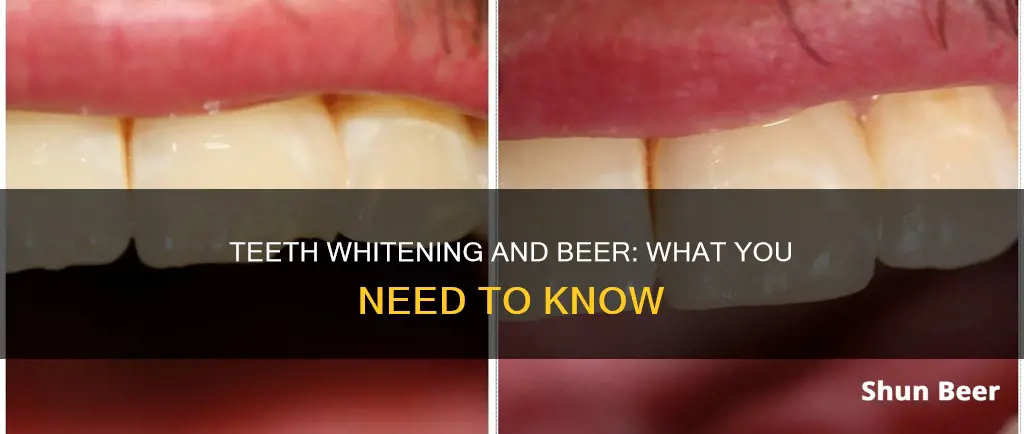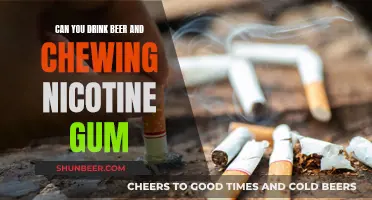
If you've recently had your teeth whitened, you might be wondering if it's safe to drink beer. The short answer is that it's best to avoid beer, especially darker varieties, for at least 48 hours after whitening your teeth. This is because your teeth are more vulnerable to staining during this period, and beer—especially darker beers—can stain your teeth.
Here's what you need to know about drinking beer after teeth whitening.
The first 48 hours after teeth whitening are crucial. During this time, your teeth are more porous and susceptible to staining. This is because the whitening process uses bleaching agents like hydrogen peroxide or carbamide peroxide, which open the pores in the enamel. Drinking beer, especially darker beers with strong colouring, can easily stain your teeth and negate the whitening effects.
In addition to the colouring, the acidity found in beer and other alcoholic drinks can also impact your teeth. Acidic beverages temporarily soften and erode tooth enamel, making it more vulnerable to staining.
To maintain your whitened teeth, it's recommended to avoid dark and acidic foods and beverages for at least 48 hours after the whitening treatment. This includes not only beer but also red wine, coffee, tea, berries, and tomato sauce.
After 48 hours, your teeth should be fully rehydrated and less susceptible to staining. You can gradually resume your usual drinking habits, but moderation is key. Always rinse your mouth with water after consuming any beverages that might stain your teeth, and practice good oral hygiene by brushing and flossing regularly.
| Characteristics | Values |
|---|---|
| Waiting period before drinking beer | 24-48 hours |
| Beer type | Lighter beers are less likely to cause discolouration |
| Other drinks to avoid | Red wine, coffee, tea, dark sodas, orange juice, tomato sauce |
| Recommended drinks | Clear or white beverages, water |
| Other recommendations | Use a straw, maintain oral hygiene, avoid dark and acidic foods |
What You'll Learn

How long should I wait before drinking beer?
After getting your teeth whitened, it is best to wait at least 48 hours before drinking beer. During this time, your teeth are particularly vulnerable to staining as they are more porous and susceptible to discolouration.
The ideal waiting period before consuming alcohol is dependent on the type of whitening treatment and can vary from person to person. However, it is recommended that you avoid drinking beer, especially darker varieties, for at least 24 to 48 hours. Lighter beers are less likely to cause discolouration but should still be consumed with caution.
Beer, especially darker varieties, can stain your teeth due to the presence of pigments that can be easily absorbed by the porous enamel, potentially undoing the effects of the whitening treatment. Additionally, alcoholic drinks are diuretics, which can lead to dehydration and make your teeth appear dull. The acidity of beer can also slightly weaken the enamel, making your teeth more prone to future staining.
Tips for maintaining whitened teeth:
- Avoid alcohol for at least 48 hours after the treatment.
- Drink plenty of water to rinse away acids and staining agents.
- Use a straw to minimise contact between the beer and your teeth.
- Practise good oral hygiene by brushing and flossing regularly.
- Avoid dark and acidic foods and beverages during the first 48 hours.
Beer and Metro North: What's Allowed?
You may want to see also

What foods and drinks should I avoid?
After getting your teeth whitened, it's important to be mindful of what you consume to maintain the results. Here's a detailed guide on the foods and drinks you should avoid:
Avoid Acidic Foods and Drinks
Fruits, fruit juices, and alcoholic beverages can be acidic, which can erode the enamel of your teeth. It is best to steer clear of highly acidic foods and drinks for at least the first 48 hours after whitening. This includes citrus fruits, as well as beverages like wine and beer. The acidity in these drinks can temporarily soften your enamel, making your teeth more prone to staining.
Stay Away from Dark-Coloured Drinks and Foods with Colourants
Dark-coloured alcoholic drinks, such as red wine and dark beers, contain pigments called chromogens that can easily stain your teeth. These pigments can penetrate and discolour the porous surface of your teeth. It is recommended to avoid coffee and tea as well, due to their strong tinting properties. If you must indulge, consider using a straw to minimise contact with your teeth.
In addition to beverages, avoid foods with strong colourants and additives, such as beets, pasta sauce, BBQ sauce, and tomato sauce. These can also affect the colour of your teeth and fade the whitening effects.
Limit Sugar Intake
Sugar is not only acidic, but it also contributes to tooth decay over time. Fizzy drinks, which often contain high amounts of sugar, can increase the risk of tooth decay and enamel erosion. It is best to minimise or avoid these drinks altogether.
Practice Good Oral Hygiene
Maintain good oral hygiene by brushing and flossing regularly. This will help remove any residual food particles and prevent staining. Using a whitening toothpaste can also help maintain the brightness of your teeth.
Avoid Caffeine and Dark Chocolate
Caffeine, including dark chocolate, should be avoided as it can stain your teeth. Opt for white chocolate or other non-caffeinated treats if you're craving something sweet.
Be Mindful of the First 48 Hours
The first 48 hours after whitening are the most crucial. During this period, your teeth are particularly vulnerable to staining, so it is essential to be cautious about what you consume. After this initial period, you can gradually reintroduce some of the foods and drinks mentioned, but it's important to do so in moderation.
Remember, teeth whitening is not a permanent solution, and touch-up treatments may be needed to maintain the desired shade. Taking care of your teeth by being mindful of what you eat and drink will help prolong the results.
Beer Sediment: To Drink or Not?
You may want to see also

What are the effects of alcohol on my teeth?
Alcohol can have several effects on your teeth, and these can vary depending on the type of alcohol and the amount consumed. Here are some key points to consider:
Staining
Alcoholic drinks, especially those with deep hues like red wine, sangria, and dark beers, can stain your teeth. The chromogens (colour pigments) in these drinks attach to the tooth enamel, causing discolouration. The acidity in alcoholic drinks can also temporarily soften the enamel, making your teeth more prone to staining. To minimise staining, it is recommended to use a straw, rinse your mouth with water after drinking, and maintain good oral hygiene.
Dry Mouth
Alcohol can dry out your mouth, reducing saliva flow. Saliva plays a crucial role in oral health by helping to wash away bacteria. When you have dry mouth, bacteria can cling to the enamel, increasing the risk of tooth decay. Drinking water along with alcoholic beverages and chewing sugar-free gum can help counteract dry mouth.
Bacteria and Tooth Decay
Alcohol, especially sugary drinks, can promote the growth of harmful bacteria in the mouth while hindering the development of beneficial probiotic bacteria. The bacteria in your mouth feed on sugar, producing acids that weaken the enamel and cause tooth decay. Alcoholic beverages high in sugar content contribute to this process, increasing the risk of tooth decay and plaque buildup.
Irritation and Tissue Damage
Heavy drinking can irritate the tissues inside your mouth and, in severe cases, lead to tooth loss. Alcohol can also enhance the harmful effects of tobacco, increasing the risk of oral cancer.
Grinding and Clenching
Alcohol consumption can trigger or worsen teeth grinding, especially when combined with caffeine. Teeth grinding can lead to tooth damage and other oral health issues.
In summary, while moderate alcohol consumption may not have a significant impact on your teeth, heavy drinking can lead to various oral health issues. To minimise the effects of alcohol on your teeth, it is recommended to practise good oral hygiene, stay hydrated, and consume alcoholic beverages in moderation.
Beer Fast: Does It Work Quickly?
You may want to see also

What are the best alternatives to beer?
If you've recently whitened your teeth, it's best to avoid beer for at least 48 hours. Darker alcoholic drinks, such as beer, can impact the whitening process and cause discolouration. So, what are the best alternatives to beer?
Hard Seltzer
Hard seltzers are often low in ABV, calories, and carbs, making them a refreshing and drinkable alternative to beer. They usually serve as a boozy base for fruit flavours like lemon, mango, or berries. While they may not be as flavourful as beer, they are a great option if you're looking for something lighter and easier to drink.
Hard Kombucha
Hard kombucha is another alternative to beer. It is fermented from tea with a symbiotic culture of bacteria and yeast, giving it a naturally tangy and funky flavour. Kombucha often has added juices and other additives to enhance its flavour and nutritional value. It also has probiotic properties, which can aid in digestion and gut health.
Light Beer
If you're looking for a beer that's a bit lighter and less filling, consider a light beer. Many craft breweries now offer low-cal, low-carb beers that still pack a lot of flavour. Brut IPAs, for example, are dry and effervescent, with fewer calories and carbs than a typical IPA.
Gluten-Removed Beer
For those with gluten sensitivities, gluten-removed or gluten-reduced beers are a great alternative. While they don't completely remove gluten, they break it down into smaller fragments, making it easier for the body to process. These beers are brewed with the usual grains, so they don't taste much different from regular beer.
Cider
Cider is another excellent alternative to beer. Farmhouse-style ciders, in particular, use a similar Belgian yeast for fermentation, resulting in estery, fruity, and slightly tart flavours. Pear cider, also known as perry, is another option that tends to be sweeter and less acidic than apple cider.
Beer Drinking and Triglycerides: What's the Connection?
You may want to see also

How can I maintain my whitened teeth?
Maintaining your whitened teeth requires some care and attention, especially in the first few days after the procedure. Here are some detailed tips to help you preserve that bright smile:
Avoid Certain Foods and Drinks
In the first 48 hours after whitening, your teeth are particularly vulnerable to staining. It is essential to avoid dark-coloured drinks and foods, such as:
- Red wine
- Coffee liqueurs
- Dark beers
- Tea
- Coffee
- Fruit juices
- Fizzy drinks
- Citrus fruits
- Berries
- Tomato sauce
- Pasta sauce
- BBQ sauce
- Beetroot
- Peas
- Broccoli
- Sprouts
- Green beans
- Sweet corn
Choose Lighter Alternatives
If you must indulge in an alcoholic drink, opt for clear spirits like vodka or gin. However, be cautious if you mix them with sugary or dark-coloured mixers. Also, stick to white varieties if you're drinking wine.
Timing is Key
Ideally, you should avoid alcohol for at least 48 hours after whitening your teeth. This waiting period allows your teeth to rehydrate and stabilise, reducing the risk of new stains. After 48 hours, your teeth will start to recover, but it's still best to limit your alcohol intake and rinse your mouth with water frequently.
Practice Good Oral Hygiene
Maintain good oral hygiene by brushing and flossing regularly. Using a whitening toothpaste can also help to maintain the brightness of your teeth.
Stay Hydrated
Drink plenty of water to help rinse away acids and staining agents. Drinking water alongside or immediately after consuming alcohol can help mitigate potential damage.
Use a Straw
If you do choose to drink any dark-coloured beverages, use a straw to minimise contact with your teeth, thus reducing the risk of staining.
Regular Dental Check-Ups
Maintain your bright smile by visiting your dentist for professional cleanings and check-ups.
Beer and Straws: A Refreshing Combination?
You may want to see also
Frequently asked questions
It is best to avoid drinking beer for at least 48 hours after teeth whitening.
Alcoholic drinks are diuretics, which can lead to dehydration and a dry mouth. This can make your teeth appear dull and increase the risk of staining. Alcohol can also stain your teeth, especially darker drinks like red wine and dark beers, which contain pigments that can be easily absorbed by the porous enamel. Additionally, the acidity in alcoholic drinks can weaken the enamel, making your teeth more prone to staining.
It is recommended to avoid alcohol for at least 48 hours after teeth whitening to allow the enamel to rehydrate and stabilise. Drinking water alongside alcohol can help rinse away acids and staining agents. Using a straw can also minimise contact between the alcohol and your teeth. Maintaining good oral hygiene by brushing and flossing regularly is also important, and using a whitening toothpaste can help maintain the brightness of your teeth.
In addition to alcohol, it is best to avoid dark-coloured and acidic foods and beverages during the first 48 hours after teeth whitening. This includes coffee, tea, red wine, berries, tomato sauce, and citrus fruits. Opt for white foods such as chicken, fish, rice, and pasta.
Teeth whitening is not a permanent solution, and touch-up treatments may be needed to maintain brightness. It is important to be mindful of what you eat and drink to prolong the effects of the whitening treatment.







